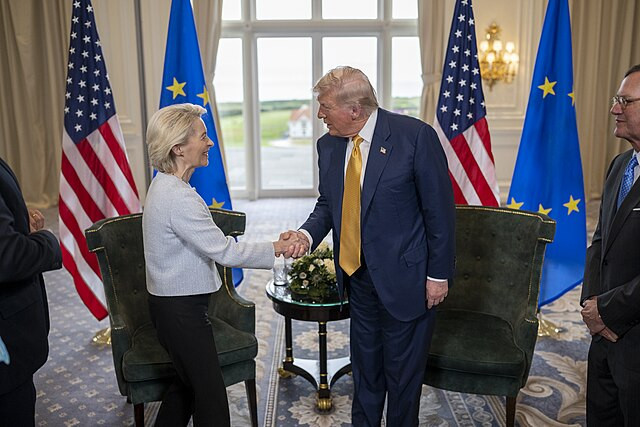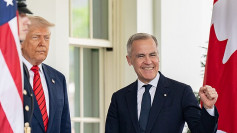The European Union and the United States unveiled a coordinated new wave of sanctions on Russia this week, intensifying pressure on President Vladimir Putin's war economy and aiming to force Moscow into peace negotiations over Ukraine. The measures mark one of the toughest joint economic offensives since the invasion began more than three years ago.
The EU on Thursday formally adopted its 19th sanctions package, banning imports of Russian liquefied natural gas for the first time and blacklisting more than 100 ships in Russia's so-called "shadow fleet" - vessels used to evade existing oil restrictions. The new penalties expand the bloc's sweeping energy embargoes to strike directly at what European Commission President Ursula von der Leyen called "the heart of its war economy."
"For the first time we are hitting Russia's gas sector - the heart of its war economy," von der Leyen said. "We will not relent until the people of Ukraine have a just and lasting peace."
The move came one day after President Donald Trump announced what he called "tremendous" new sanctions on Rosneft and Lukoil, Russia's two largest oil producers - a significant escalation from earlier U.S. measures that had focused primarily on technology and banking. Trump said it was the appropriate time to impose the measures and expressed hope they would not remain in place for long.
Kaja Kallas, the EU's high representative for foreign affairs and security policy, said Europe welcomed Washington's policy shift. "It is really depriving Russia of the means to fund this war and this is necessary to end this war," Kallas told CNBC. She added in a social media post that the EU package would also target Russian banks, cryptocurrency exchanges, and entities in India and China that have helped Moscow bypass sanctions.
Energy revenues remain central to Putin's ability to sustain the conflict, allowing Moscow to bankroll its armed forces while keeping domestic inflation under control. European officials said cutting off Russian oil and gas exports is now crucial to disrupting those flows. Danish Foreign Minister Lars Lokke Rasmussen called the joint transatlantic actions a "decisive step" to shut down Russia's largest revenue stream.
Ukrainian President Volodymyr Zelenskyy, who joined EU leaders in Brussels on Thursday, hailed the measures as a breakthrough after months of lobbying Western allies for tougher penalties. "We waited for this. God bless, it will work. And this is very important," Zelenskyy said.
The sanctions follow months of U.S.-led diplomatic efforts to restart stalled peace talks. But with Russian forces pressing on multiple fronts and Ukraine's counteroffensives slowing, the war has hardened into a costly stalemate. Ukrainian troops continue to repel Russian advances along a 1,000-kilometer front, while Moscow has intensified long-range strikes on Ukraine's power grid ahead of winter. Kyiv has retaliated with drone attacks on Russian oil refineries and industrial hubs.
The overnight fighting continued as officials in the Kharkiv region reported a "double-tap" Russian drone strike that killed one emergency worker and wounded five others, while Russian forces claimed to have intercepted more than 130 Ukrainian drones targeting Crimea and border regions.
The new sanctions also rattled global energy markets. Brent crude rose 3.3% to $64.66 a barrel, while U.S. West Texas Intermediate gained a similar margin to $60.46. Tamas Varga, an analyst at PVM Oil Associates, said Trump's move "is the first time Trump has sanctioned the Russian oil industry," calling the decision "significant."
Still, he cautioned that "whenever Russian producers were targeted in the past by the EU or by the G7, there have always been willing offtakers of Russian oil." Varga added that the full impact may depend on consumer countries following suit. "For this reason, India's decision to significantly reduce its purchases of Russian oil is almost as significant as the U.S.-imposed measures," he said.






